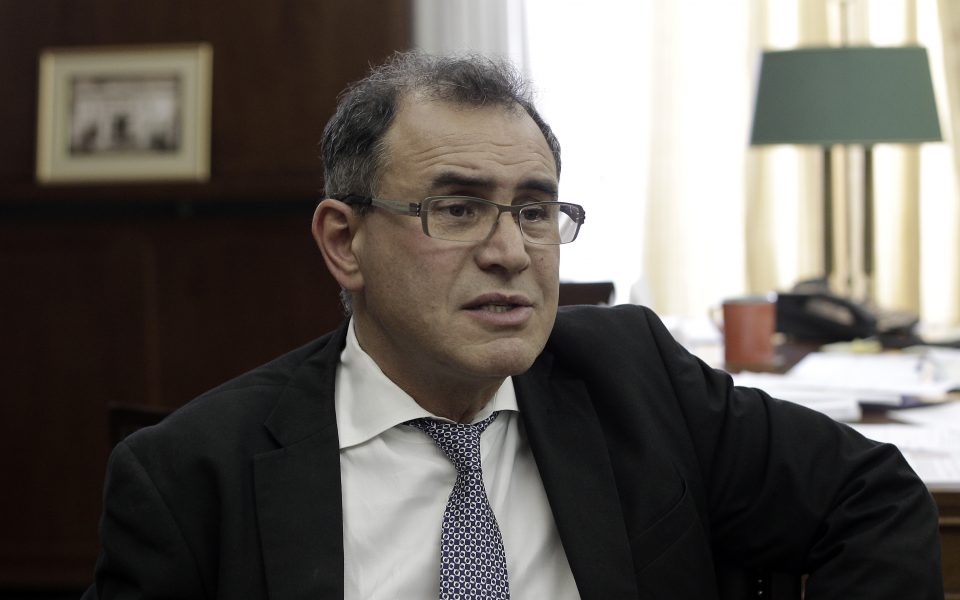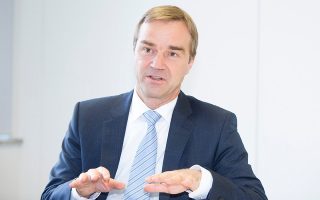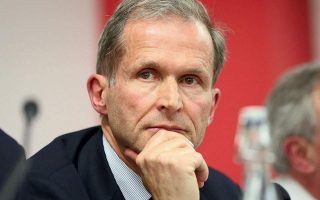Investment capital seeks opportunities in Greece
Nouriel Roubini talks to Kathimerini about exiting the coronavirus pandemic crisis and other economic issues facing the world today

Nouriel Roubini, the renowned American economist who predicted the 2008 global financial crisis – and for that reason was nicknamed “Dr Doom” – participated in a webinar-discussion organized by the Harvard Business School Club of Greece in September last year.
Recently, the world has been paying close attention to his views on economic issues related to Covid-19, stagflation and bitcoin, among others.
Now the professor of economics at New York University’s Stern School of Business and head of macroeconomic, policy and financial markets research firm Continuum Economics talks to Kathimerini about challenges and opportunities in Greece, Europe and the world.
Professor Roubini, what’s your view on Greece? Do you see a return to growth or rather stagnation for some years?
Last year the contraction of the Greek economy was slightly smaller than Italy’s. But now we are talking about the future. There’s positive change, not only for Greece but for the eurozone as a whole. It starts in the second quarter, there’s strong recovery of growth. Specifically for Greece, the number of coronavirus cases falls sharply, the economy soon reopens, gradually but significantly by May. The contagion is expected to be even slower in the summer due to rising temperatures and also because vaccination will be accelerated. In addition, there are very accommodative economic policies. The European Central Bank is easing further, it purchases bonds and Greek bonds are eligible for purchase. Also, grants and low-rate loans as part of the recovery fund provide a significant stimulus which will increase productivity if it is used for investments in the digital transformation and the green economy. And even the International Monetary Fund has suggested recently that the [Greek] debt is sustainable given reasonable scenarios of growth and interest rates.
What’s your opinion of the current government?
Prime Minister Kyriakos Mitsotakis understands the kind of reforms that are needed. He is showing leadership, he is boosting the business sentiment in the country. So investment capital will be looking for opportunities to come to Greece.
Ten years ago you suggested that Greece should default and leave the euro as a way to restart growth. Some people in Greece are still debating whether the country would have done better in the last decade if we had dared to leave. Did we miss an opportunity to do even better?
What I said back in 2010 was that the country needed a debt restructuring because the debt burden was excessive. And debt restructuring did finally occur by using collective action clauses (CAC). There was indeed a restructuring of the debts to the private sector. At the same time the troika provided a bailout, offering time for adjustment, making debt more sustainable, together with a number of economic reforms. There was of course debate whether the austerity was excessive but, in any case, you could not run excessive deficits and some form of austerity was necessary. I never had a proactive argument for leaving the eurozone. There were many arguments against leaving and the strongest was that if the country was to achieve a very large bailout package, then it could overcome the crisis while remaining a member of the eurozone. It turned out that Greece got a huge bailout, 200 billion euros. It was the carrot to remain, to retain competitiveness and adjust. It was the right thing to do.
How about the Turkish economy? Are the big problems it faces perilous? Is it too big to fail?
The root of Turkey’s problems is macroeconomic mismanagement. Turkey used to have sensible policies when Greece was in a macroeconomic crisis that led to solvency problems. Now Greece has sensible policies. EU fiscal stimulus and ECB monetary policies do the right job while reforms are designed to attract investments. Now Turkey is facing an excessive deficit because of the extension of credit to state entities, financial repression and capital controls and loose monetary policy. The central bank governor was just fired. We see inflation rising alongside a free fall of currency. Instead of reforms we see highly unorthodox policies. Turkey used to have high credibility with investors but now it is not the case.
Do you see the eurozone moving toward even greater integration?
Technically speaking, there are not joint liabilities in the eurozone and the new debt issued to combat the coronavirus crisis will be faced out over time. But when debt is issued, then it is very difficult politically to raise taxes to return debt to zero. Therefore, this debt will be a feature of the European debt market and a joint liability. Also, the expansion of the common budget from 1% to 2% of GDP is also here to stay. These are developments towards a permanent fiscal union. Europe goes step by step to create a fiscal union.
You’ve said that the US recovery will be K-shaped as opposed to V-shaped. Would this create even more political and social instability?
A K recovery reflects rising income and rising inequality. Certainly it may cause more social and political instability. But bear in mind that US President Joe Biden is aware that minorities and many workers suffer more. That’s why a big part of the 1.9-billion-dollar package passed by Congress goes to the unemployed, to those left behind.
It is said that the stimulus is too big, and will lead to economic overheating and inflation.
Until recently the debate was that the recovery would be weak. Now there is talk that the stimulus might be excessive. Indeed, $3 trillion passed in March of last year, $900 billion in the summer of last year, now $1.9 trillion and another $3 billion are in the pipeline for infrastructure over the next decade. Some economists, like Lawrence Summers, argue about the economy overheating and inflation. The Treasury yield went from 0.9% to 1.7% and rising. But on the other hand too many houses have not paid bills. Therefore, inflationary pressure is going to be smaller than expected. We will see. The debate is on…
You have warned against negative supply shocks in the world economy. What does that mean?
The world economy will face negative supply shocks. Aging of population in all countries, even in China, is a negative supply shock. Aging populations and restrictions on migration restrict supply, increase wages and cause inflation. The risk of fragmentation of the global economy because of trade wars and decoupling between the US and China is also a negative supply shock. If not properly addressed, negative supply shocks lead to fiscal deficits. Then governments tend to monetize deficits (by issuing money), bringing us back to inflation.
You’ve argued that bitcoin is a speculative bubble devoid of any intrinsic value. But in a world of climate uncertainty and rising inflation, might it become a deposit of value? Some people say it is gold in digital form. Why not?
To say that bitcoin is a digital gold is a misnomer. Gold is used in industry, it gives you utility in the form of jewelry. Bitcoin is not wearable. It would be tacky and ugly. Gold was used as a store of value for thousands of years and also against political and geopolitical risk. It has monetary function, it is a credible means of payment. Bitcoin is none of the above. Only four transactions per second can be done in bitcoin compared with the 25,000 that are processed per second by Visa. It’s neither an asset nor a currency. It is based on speculation. Also, the so-called “mining” of bitcoin requires energy consumption of a country like Argentina. It is an environmental disaster.
The HBS Club of Greece
The Harvard Business School Club of Greece, whose members Nouriel Roubini had a conversation with last year, is one of the leading forums of Southeast Europe. It was established in 2002 by the international economist Stelios Zavvos, who is also its president, and it organizes speeches and meetings where ideas and views on important issues are explored and discussed. Among its members are Prime Minister Kyriakos Mitsotakis, former prime minister Antonis Samaras and former finance minister Stefanos Manos, the businessmen and entrepreneurs Dimitris Papalexopoulos, Efthymios Vidalis, Constantine Petropoulos and Paris Kyriacopoulos, as well as other distinguished figures. Among its distinguished speakers are the Nobel Prize winners Edmund Phelps and Joseph Stiglitz, professors Jeffrey Sachs, Dani Rodrik, Tommaso Padoa Schioppa and the economists Kemal Dervis, Daniel Gros, Lorenzo Bini Smaghi and Jean Pisani-Ferry.





